Nutrition Science & Dietetics News
Latest nutrition newsletter now available online
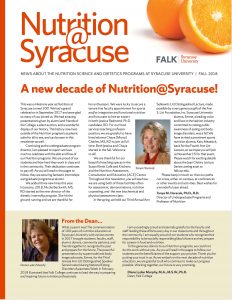 From the latest news and events in the Nutrition program to highlights of student and faculty projects, read the latest edition of Nutrition News covering the nutrition, nutrition science and dietetics programs in Syracuse University’s Falk College.
From the latest news and events in the Nutrition program to highlights of student and faculty projects, read the latest edition of Nutrition News covering the nutrition, nutrition science and dietetics programs in Syracuse University’s Falk College.
Click on the link below to download a PDF copy of the most recent newsletter or view an accessible, text-based version of the Newsletter.
Falk College welcomes new faculty and staff
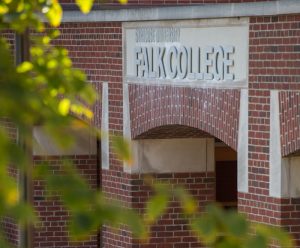 Syracuse University’s Falk College is pleased to announce the appointment of new staff members who have joined Falk College in the past academic year, including Nikki Beckwith, director of dietetic internship program, Trinity Benton, kitchen technician, and Deana Hansen-Danis, procurement coordinator in the Department of Public Health, Food Studies, and Nutrition; Bradford Ducre, computer consultant in information technology, and; Lisa Liparulo, internship placement coordinator in the Department of Sport Management.
Syracuse University’s Falk College is pleased to announce the appointment of new staff members who have joined Falk College in the past academic year, including Nikki Beckwith, director of dietetic internship program, Trinity Benton, kitchen technician, and Deana Hansen-Danis, procurement coordinator in the Department of Public Health, Food Studies, and Nutrition; Bradford Ducre, computer consultant in information technology, and; Lisa Liparulo, internship placement coordinator in the Department of Sport Management.
It also welcomes ten new faculty members, Chaya Charles, Jennifer Genovese, Ryan Heath, Bryce Hruska, Kenneth Marfilius, David Meluni, Jessica L. Garay, Sara Vasilenko, Bhavneet Walia, and Najah Zaaeed.
Chaya Lee Charles, M.S., R.D.N., C.S.G., C.D.N.
Nutrition & Food Studies
Chaya Charles joins the Department of Nutrition & Food Studies as an assistant teaching professor in the nutrition program.
Prior to her appointment as assistant teaching professor, Charles has worked as an adjunct instructor in the Department of Nutrition & Food Studies at Falk College since 2014. In addition, she is currently a consultant dietitian for Sodexo at Menorah Park and senior nutrition consultant for Oswego County Opportunities. She has previously held titles such as outpatient dietitian, clinical dietitian, and nutrition services manager at various health care facilities.
Charles completed both her B.S. degree in nutrition, and her M.S. degree in nutrition science at Syracuse University. Her master’s thesis is titled “Comparing Vegan and Vegetarian Attitudes, Beliefs and Perceptions with Risk for Disordered Eating Behavior.” She is also published in the Journal of the Academy of Nutrition and Dietetics.
Charles is a board-certified specialist in gerontological nutrition, a registered instructor for the National Restaurant Association’s ManageFirst Program courses, ServSafe certified, and certified in food and beverage cost control. She is the recipient of the 2014 Sodexo Clinical Innovation Award, 2011 Sodexo Northeast Regional Dietitian of the Year, and winner of the 2010 National Sodexo Nutrition Outcomes Study.
Areas of specialization: Vegetarianism and disordered eating behaviors, malnutrition prevention in the elderly, cardiovascular and diabetic nutrition counseling, nutritional intervention for wound healing, weight loss counseling, meal planning guidance and the provision of nutritious menus in institutional and home settings.
Jennifer Cornish Genovese, A.C.S.W., Ph.D.
School of Social Work
Jennifer Cornish Genovese joins Syracuse University’s Falk College as an assistant teaching professor in the School of Social Work. She has previously taught in the College’s Department of Human Development and Family Science and in the School of Social Work, including courses such as Power, Conflict, & Violence in the Family; Interpersonal Competence; Family Systems Theory; Advanced Practice with Individuals, Families, and Groups; and Practice with Children, Adolescents, and Families.
Genovese is a NYS Licensed Certified Social Worker and has worked in private practice as a psychotherapist for 30 years. She specializes in the treatment of abused children and adolescents. She is a clinical consultant for the NYS Department of Social Services and facilitates monthly support groups on secondary traumatic stress of child welfare workers in multiple Central New York counties. She is also a program and ministry consultant for the Bishop of the Evangelical Lutheran Church Upstate NY Synod.
Genovese has presented for the National Association of Social Workers (NASW) Professional Symposium in Chicago, IL and for NASW’s Annual Meeting. She was previously employed by St. Joseph’s Hospital Health Center as the outpatient clinic manager of the Mental Health Services Department. Genovese formerly served on the board of directors for Girls Inc. and the Mohawk Valley Committee for the Prevention of Child Abuse and Neglect. She was the co-host of two long-running radio programs in Syracuse, NY: Teen Talk on 93Q FM and Parenting Matters on 570 AM and 88 WAER FM.
Genovese completed a Ph.D. in child and family studies and M.S.W. at Syracuse University’s Falk College, as well as a B.A. in sociology from the State University of New York College at Cortland.
Areas of specialization: Assessment and treatment of physically and sexually abused children and adolescents, treatment of bereavement, loss and trauma in children, adolescents, and identification and intervention of secondary traumatic stress of child welfare workers.
Ryan D. Heath, M.A, L.C.S.W., Ph.D.
School of Social Work
Ryan Heath joins the School of Social Work as an assistant professor. Heath’s research seeks to understand how out-of-school programs (e.g., extracurricular, afterschool and summer programs) promote the social-emotional development of low-income youth, students of color, and other historically marginalized youth. To improve the reach, quality, and impact of these programs, his work aims to elucidate how extracurricular programs interface with other social-ecological contexts that affect youth, such as schools, peers and families, and to identify the potential mechanisms through which extracurricular programs influence youth’s social-emotional development and educational attainment. He has been involved in several research projects, most recently as a collaborator on the “Becoming Effective Learners—Out-of-School Time Study” with The Consortium for School Research at the University of Chicago. Heath has published in Youth & Society, Urban Review, Urban Education, LGBT Health, and Pediatric Research. He is also co-author of the research report, Foundations of Young Adult Success: A Developmental Framework.
Prior to joining Syracuse University, Heath taught classes on research methods and cognitive-behavioral therapy at the School of Social Service Administration at the University of Chicago. As a clinical social worker, Heath has implemented cognitive-behavioral interventions with adolescents and youth groups in both school-based and community settings. He previously worked as a clinical director for Chicago Adventure Therapy, as a school-based therapist at UCAN, as a therapeutic learning coach for Project EDGE of OMNI Youth Services, and as a teen outreach program coordinator at Health Quarters.
Heath earned a master’s degree in clinical social work and a Ph.D. from the University of Chicago School of Social Service Administration. As a doctoral student, Heath received a pre-doctoral fellowship from the Institute of Education Sciences and the University of Chicago Committee on Education, and completed a graduate certificate in interdisciplinary education sciences. He completed a bachelor’s degree in science with honors from Brown University.
Areas of specialization: Adolescent development, extracurricular and out-of-school programs, social-emotional learning, educational attainment, youth social services, school and community partnerships.
Bryce Hruska, Ph.D.
Public Health
Bryce Hruska is an assistant professor in the Falk College public health program where he has served as a research assistant professor, postdoctoral researcher, and project manager for the public health program. He was previously a postdoctoral fellow at the Vermont Center on Behavior and Health.
Hruska’s research focuses on better understanding how psychological stress “gets under the skin” to impact physical health. Since coming to Falk College, his work has primarily consisted of overseeing the operations of two research projects: “Environmental Toxicants, Race, and Cardiovascular Disease Risk in Children” and “The Psychosocial and Physiological Consequences of Taking and Not Taking Time Off from Work.”
He has most recently published in the Journal of Substance Abuse Treatment, Headache: The Journal of Head and Face Pain, as well as Environmental Research, Psychology of Addictive Behaviors, and Social Science and Medicine, among others. He has published book chapters in the Handbook of Cardiovascular Behavioral Medicine and in Trauma and Substance Abuse: Causes, Consequences, and Treatment of Comorbid Disorders, Second Edition.
Hruska has presented his research at conferences including the International Society for Traumatic Stress Studies, the American Psychosomatic Society, and the College on Problems of Drug Dependence. He has made multiple media appearances promoting the research that he and his collaborators are performing, and he serves as an invited reviewer for a number of peer-reviewed journals including the Journal of Traumatic Stress, Journal of Anxiety Disorders, Stress and Health, Addictive Behaviors, and Journal of Psychoactive Drugs.
Hruska earned an M.A. and Ph.D. in experimental psychology, with concentrations in health psychology and quantitative methods, both from Kent State University. He earned a bachelor’s degree in psychology from the University of Akron.
Areas of specialization: Traumatic events, posttraumatic stress disorder (PTSD), stress and health, occupational stress, recovery experiences, quantitative methods.
Kenneth James Marfilius III, L.C.S.W., D.S.W.
School of Social Work
Kenneth Marfilius joins Falk College as a visiting teaching professor in the School of Social Work.
While active duty, Marfilius served in the U.S. Air Force Biomedical Science Corps in multiple roles: active duty clinical social worker, mental health therapist, family advocacy officer in charge, and as manager of the alcohol and drug prevention and treatment program. He was commissioned in 2013 and was discharged in 2016 having obtained the rank of captain. At the Barksdale Air Force Base, Marfilius served in a variety of mental health roles related to sexual assault prevention and response, suicide prevention, and traumatic stress. Marfilius has also worked for the U.S. Department of Veteran Affairs at the Syracuse VA Medical Center in the Healthcare for Homeless Veterans Program, and as a disruptive behavior committee member.
Marfilius previously taught courses such as Social Work Practice in Mental Health and Introduction to Military Culture and Social Work Practice, as well as guest and continuing education lectures at Falk College, and has presented for the Supportive Services for Veterans and Families (SSVF) and at the Association for Humanistic Counseling National Conference. He recently guest lectured at the University of Pennsylvania on “Trauma— Informed Care, Housing First, and Critical Time Intervention for Veteran Homelessness.”
Marfilius is honored with a National Defense Service Medal, Global War on Terrorism Service Medal, and Nuclear Deterrence Operations Service Medal. He is a recipient of the U.S. Air Force Health Professions Scholarship and the U.S. Air Force Outstanding Unit Award and has twice been awarded the Barksdale Air Force Base Medical Operations Squadron Company Grade Officer of the Quarter.
Marfilius earned a doctorate in clinical social work (D.S.W.) and master of social work (M.S.W.) from the University of Pennsylvania School of Social Policy and Practice, and a bachelor’s degree in psychology with a minor in public health from Syracuse University.
Areas of specialization: Military mental health, military families, veteran social work, homelessness, domestic violence, suicide prevention, substance use prevention and treatment, and military culture and social work practice.
David Meluni, M.S.
Sport Management
David Meluni is a teaching professor in the Department of Sport Management, where he served as an adjunct over the past four years.
Meluni has over 18 years of experience in the sport industry, including two years as vice president of sales and business development for both 805 Stats and Infinity Sports and Entertainment. He also spent five years as the vice president of sales at SIDEARM Sports. In his tenure at SIDEARM, he negotiated and signed agreements with the University of Texas, University of Kansas, the Heisman Trophy, and the Maui Invitational as well as with several Division I, II and III institutions.
He has also worked with the New York Collegiate Baseball League as a member of its executive team. Prior to working in the digital space, the Syracuse native spent 10 years with IMG College, the multi-media rights holder at Syracuse University, where he maintained a client base of over $1.1 million per year.
Meluni serves on the board for the Camillus Softball and Baseball Association, coaches multiple travel teams for the Camillus Wildcats, and is a volunteer assistant coach for the West Genesee varsity baseball team.
Meluni earned a bachelor’s degree from Ithaca College in sport management, where he also acted as captain and NCAA All-Region Infielder for the Bombers’ baseball team. In 1999, he was selected to attend the prestigious NCAA Leadership Conference. He then attended Florida State University as a graduate assistant in the Seminoles’ ticket office and earned a master’s degree in sport administration. He worked as a marketing assistant at FSU, assisting with football, women’s volleyball, men’s basketball, baseball, and softball.
Areas of specialization: Sport sponsorship sales, ticket sales, technology in sport and sports marketing and promotion.
Jessica L. Garay, M.S., R.D.N., F.A.N.D.
Nutrition & Food Studies
Jessica Garay joins the Department of Nutrition & Food Studies as an instructor in the nutrition program.
Previously, Garay worked at Utica College as an assistant professor of biology: physiology & nutrition since 2016. From 2010-2016, she was an adjunct instructor at Syracuse University and has held positions at Onondaga Community College and George Washington University, as well as the Washington Cancer Institute and Food Bank of Central New York.
Garay is published in the European Journal of Applied Physiology, Medicine & Science in Sports and Exercise, the American Journal of Human Biology, and Current Biomarker Findings, among others. She has presented at the International Society of Behavioral Nutrition and Physical Activity Conference and the NYS Academy of Nutrition and Dietetics (NYSAND) Annual Meeting.
Garay is the recipient of a 2016 Emerging Dietetic Leader Award from the NYSAND and currently serves as its public policy coordinator. Garay has held several roles with the Dietitians in Integrative and Functional Medicine Dietetic Practice Group and is currently the research chair. Her other volunteer work includes serving as an evidence analyst for the Academy of Nutrition & Dietetics’ Evidence Analysis Library, and as a member of the American Dairy Association North East’s Sports Nutrition Advisory Panel.
Garay is completing a Ph.D. in science education, specializing in exercise science, from Syracuse University. She earned an M.S. in exercise science, specializing in nutrition and eating behaviors, from George Washington University. She completed her dietetic internship at the Yavapai County Health Department in Prescott, AZ. She completed a B.S. in nutritional sciences and a B.S. in human development at Cornell University.
Areas of Specialization: Fetal programming, nutrition and athletic performance, dietary supplements.
Sara A. Vasilenko, M.S., Ph.D.
Human Development and Family Science
Sara Vasilenko joins the Department of Human Development and Family Science as an assistant professor.
Prior to joining Falk College, Vasilenko served as a research assistant professor in Health and Human Development and as a research associate in the Methodology Center at Pennsylvania State University. There, Vasilenko was a postdoctoral fellow in the Prevention Research Center and Methodology Center after working as a graduate assistant in the Department of Human Development and Family Studies. Prior to her time at Penn State, Vasilenko held a research apprentice fellowship in the Department of Epidemiology and worked as a research assistant in the Department of Psychology at Michigan State University.
Vasilenko’s research spans topics related to adolescence and young adult health, sexual behavior, and drug use. She is currently a subcontract PI on a grant from the Office of Adolescent Health, which focuses on how multidimensional risk factors moderate effects of teen pregnancy prevention programs, and co-investigator on a National Institute on Drug Abuse grant focusing on how substance use and its predictors vary by age. Vasilenko is published in journals such as the Journal of Adolescence, Journal of Adolescent Health, Journal of Early Adolescence, Drug and Alcohol Dependence, Psychology of Addictive Behaviors, Journal of Sex Research, and Archives of Sexual Behavior.
Vasilenko is the recipient of a 2006 Graham Endowed Fellowship, Pennsylvania State University College of Health and Human Development. She currently is a consulting editor of the Journal of Research on Adolescence and a member of the Society for Research in Child Development, among others.
Vasilenko earned an M.S. and Ph.D. in human development and family studies at Pennsylvania State University and a B.A. in English from Kalamazoo College.
Areas of specialization: Adolescent and young adult development, sexual behavior, developmental methodology, substance use.
Bhavneet Walia, Ph.D.
Public Health
Bhavneet Walia is an assistant professor in Falk College’s public health program. Walia joined Syracuse University in 2015 from Western Illinois University where she was an associate professor of decision sciences and founding director of the business analytics post-baccalaureate certificate program.
Her fields of specialization include health economics and health econometrics. Her research and scholarship include 14 peer-reviewed journal articles that have appeared in leading journals of applied economics, health policy, and environmental policy: the American Journal of Economics & Sociology, the Journal of Economic Education, and the Southern Economic Journal, and two in Renewable Agriculture & Food Systems, Economics Letters.
The recipient of numerous awards and distinctions that include the Provost’s Award for Excellence at Western Illinois University and the WIU College of Business and Technology Award, both for excellence in campus internationalization, Walia is presently associate editor of the Academy of Economics and Finance Journal. Her professional affiliations include the Academy of Economics and Finance and the American Economic Association.
Walia’s present research efforts are focused in three areas: early child health interventions and cognitive development; mortality and behavioral effects of chronic traumatic encephalopathy and related neurodegenerative diseases; and markets for health care in the United States.
Walia holds a Ph.D. in economics with an econometrics specialization from Kansas State University, where her dissertation was entitled, “Three Essays in Health and Labor Economics.” Her master’s and bachelor’s degrees, both in economics, are from Punjab University in India.
Areas of specialization: Health care markets and policy, early childhood development, environmental health, labor market policy, statistical expertise in applied statistical programming and methodology, health statistics, biostatistics, health information systems, labor statistics, analysis of National Longitudinal Surveys, and other social and behavioral statistical analyses.
Najah Zaaeed, E.M.P.A., M.S.W., Dr.PH.
Public Health
Najah Zaaeed joins the Department of Nutrition & Food Studies as an assistant teaching professor in the public health program.
Since 2016, Zaaeed has taught as an adjunct professor in public health at Syracuse University and at SUNY Oswego. Zaaeed previously served as a mental health specialist for Interfaith Works of Central New York and as a social worker for the Islamic Society of Central New York.
Zaaeed’s research interests are in aging with intellectual and developmental disabilities, maternal and child health, effectiveness of ecological models for health awareness at global levels, and refugee health. Zaaeed authored a chapter in the book Refugee Education: International Perspectives from Higher Education and NGOs. She is also published in the International Journal of Physical Medicine and Rehabilitation and the Journal of Refugee and Global Health and has presented at the North American Refugees Health Conference.
Zaaeed is the recipient of the 2017 Selma Andrews Award from Loma Linda University, 2013 Global Health Institute, Loma Linda Research Funding, the 2013 Fadel Education Foundation Scholarship, and the 2008-2010 Prince Alwaleed Bin Talal Fellowship from the Islamic Society of North America. She is also a board member of the Society of North American Refugee Healthcare Providers.
Zaaeed earned a Dr.PH. in public health, specializing in health promotion and education, and global health, from Loma Linda University. She earned a M.S.W. and executive master of public administration from the School of Social Work and the Maxwell School of Citizenship and Public Affairs, respectively, at Syracuse University. She also earned two graduate certificates in gerontology and international leadership and non-governmental organizations from the Maxwell School at Syracuse. She earned a B.S. in paralegal education from Chancellor University.
Areas of specialization: Global health and mental health, health education and promotion, social media and health outcomes, addiction and wellness, gerontology, disability studies, maternal and child health, refugee health and social service needs
Falk College Welcomes the Class of 2022
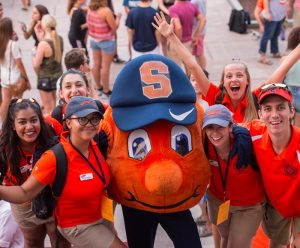 Falk College is thrilled to welcome back returning Syracuse students and to extend a special welcome to the Class of 2022, new transfer and graduate students! We are so happy to have you in the Orange family, as well as our family here at Falk College. As you meet your professors, classmates, and roommates, you’ll soon be feeling right at home. We are here to help you along the way. If you have any questions or concerns, please connect with Falk College’s Office of Student Services at (315) 443-3144 or falkss@syr.edu or visit 330 Barclay Hall in the Falk Complex.
Falk College is thrilled to welcome back returning Syracuse students and to extend a special welcome to the Class of 2022, new transfer and graduate students! We are so happy to have you in the Orange family, as well as our family here at Falk College. As you meet your professors, classmates, and roommates, you’ll soon be feeling right at home. We are here to help you along the way. If you have any questions or concerns, please connect with Falk College’s Office of Student Services at (315) 443-3144 or falkss@syr.edu or visit 330 Barclay Hall in the Falk Complex.
Here are a few tips to help you get settled during these first few weeks:
Download the Syracuse Welcome Guide. Available through the Office of First-Year and Transfer Programs, the 2018 Syracuse Welcome Guide contains the complete schedule for Syracuse Welcome 2018 and other important information about your arrival at Syracuse University.
In addition, new graduate students should visit the graduate school website and check out the calendar of events specifically for graduate students. Similarly, new international students can find helpful information by visiting the Slutzker Center for International Services.
Attend New Student Convocation for new students and families on Thursday, August 23 at 5:30 p.m. in the Carrier Dome.
Attend Falk College welcome events. Please join us for the Dean’s Reception for new students and families on Friday, August 24 from 10 to 11 a.m. in Grant Auditorium in the Falk Complex, followed by light refreshments served outside in the Falk Courtyard. Afterwards, the Dean’s Welcome Meeting for new students will take place at 1:30 p.m. in Grant Auditorium immediately followed by Department Meetings from 1:45 to 3 p.m.
Explore the Student Involvement Fair Wednesday, September 5 on the Quad from 11:30 a.m. to 3:00 p.m. In the case of rain, it will be held in Goldstein Auditorium in the Schine Student Center. With more than 300 student organizations on campus, we are confident you’ll find something that fits your interests.
Check your SU email account. As a Syracuse University student, you now have a SU email account. The University’s primary method of communication is email sent to your SU account (not your personal email account). It is very important that you check your SU email account on a regular basis so you do not miss important communications from the University. If you have any questions, please contact Information Technology Services (ITS).
Connect with Falk College on social media. You can follow us @SUFalkCollege. Many other Syracuse University offices, schools, colleges, academic programs, clubs and more are also on social media. Visit the Social Media Directory. It’s a great way to discover all that’s happening on campus.
Finally, remember the Falk College Office of Student Services is here to help you with any questions or concerns. Once again, welcome and best of luck! Let’s make this semester a great one!
Syracuse elementary students have a taste of Puerto Rico
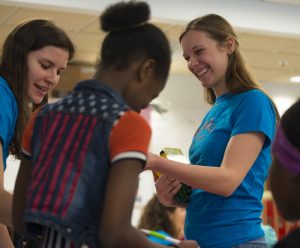
This spring, fifth grade students at Dr. Weeks Elementary School had a taste of culture and cuisine from Australia, England, New Zealand, Cuba, Iceland, and Puerto Rico with the help of Falk College nutrition students and the Books & Cooks program.
Syracuse University students in the Books & Cooks program introduce local elementary students to cultures around the world through hands-on nutrition lessons that foster literacy and healthy eating. It is housed in the Mary Ann Shaw Center, which brings together Syracuse University faculty, staff, and students in civic service.
In a lesson at Dr. Weeks, students measured and mixed pre-cut fruit, vegetables, and other ingredients to make a delicious Pico de Gallo recipe, a popular snack in Puerto Rico. Nutrition major Elizabeth Gardner ’20, who led the activity, shared that the nutrients from the tomatoes in Pico de Gallo helps people fight off illness.
This past year, Gardner served as the nutrition volunteer coordinator for Books & Cooks and was responsible for recruiting and training volunteers, as well as designing and delivering lesson plans. “By working with Books & Cooks, I came to appreciate the concept of only understanding something when you are able to explain it to someone else. Something I try to impress on my volunteers is to reflect on the way that the experience in the classroom affected them, because the way that we all interact with the students now is teaching us skills that we may use to interact with clients in dietetic counseling.”
The students at Dr. Weeks also learned topics such as MyPlate, which teaches the basics of food groups and healthy portions, as well as food safety and why it’s important to have clean cooking surfaces, clean hands, and wear gloves while preparing food.
“The students at Dr. Weeks love the Books and Cooks program, so much that other fifth grade classes are asking to participate,” says Dr. Tanya Horacek, undergraduate program director for nutrition and the Books & Cooks faculty mentor. “Elizabeth is an effective leader with her peers and facilitates each class session with ease,” she adds.
Gardner started as a volunteer with Books & Cooks in the fall of her freshman year and plans to continue until she graduates. “Through the program, I have learned that volunteering is truly a two-sided experience. Just as much as we positively affect the students we work with, they positively affect us.”
Gardner decided she wanted to become a nutritionist in high school. When it came time to pick a college, “all roads led to Syracuse,” she says. “I wanted a school that exuded pride. From students to faculty to alumni, the orange network is extensive and loud. Falk College offered a nutrition program that now has more than 100 years of existence, hands on teaching, and ample opportunity to become involved in undergraduate research.”
Upon graduation, Gardner plans to work in nutrition-related policy. “I hope to work within the realm of nutrition policy and help address demographic factors that contribute to health disparities.”
Tanya Zuckerbrot speaks at Syracuse University April 9
 Registered dietitian, author Tanya Zuckerbrot, MS, RD, will speak at Syracuse University on April 9, 6:00 p.m., in Falk 100, with a reception taking place starting at 5:00 p.m. Sponsored by Falk College’s Nutrition Education and Promotion Association (NEPA), a student-run organization that brings together Syracuse University students interested in nutrition and encourages them to share that interest with the surrounding campus and community, the event is free and open to the public. Zuckerbrot is the author of the book, The F-Factor Diet.
Registered dietitian, author Tanya Zuckerbrot, MS, RD, will speak at Syracuse University on April 9, 6:00 p.m., in Falk 100, with a reception taking place starting at 5:00 p.m. Sponsored by Falk College’s Nutrition Education and Promotion Association (NEPA), a student-run organization that brings together Syracuse University students interested in nutrition and encourages them to share that interest with the surrounding campus and community, the event is free and open to the public. Zuckerbrot is the author of the book, The F-Factor Diet.
Nutrition program hosts Emme for distinguished lecture
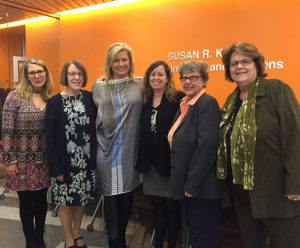 On February 28, Falk College and its nutrition program hosted supermodel and body image advocate, Emme ’85, for the Third Annual Ann Litt Distinguished Speaker Series. Coinciding with National Eating Disorders Awareness Week, her presentation, entitled “Facing our fears: Embracing the ones we’re with,” was followed by a reception and book signing of her newest book, Chicken Soup For The Soul Curvy and Confident: 101 Stories of Loving Yourself and Your Body. Guests were also treated to a “Fashion Without Limits (FWL) Pop-Up Show” with designs created by Syracuse University fashion students as part of the FWL initiative.
On February 28, Falk College and its nutrition program hosted supermodel and body image advocate, Emme ’85, for the Third Annual Ann Litt Distinguished Speaker Series. Coinciding with National Eating Disorders Awareness Week, her presentation, entitled “Facing our fears: Embracing the ones we’re with,” was followed by a reception and book signing of her newest book, Chicken Soup For The Soul Curvy and Confident: 101 Stories of Loving Yourself and Your Body. Guests were also treated to a “Fashion Without Limits (FWL) Pop-Up Show” with designs created by Syracuse University fashion students as part of the FWL initiative.
An alumna of Syracuse University’s College of Visual and Performing Arts (VPA), Emme is the iconic world’s first curvy supermodel. A TV personality, model, mom, author, brand spokesperson, creative director of her clothing lines, cancer survivor, lecturer, and globally recognized women’s advocate for positive body image and self-esteem, she is the first model invited to speak before a Congressional subcommittee in Washington, D.C. with a mission to increase public awareness of eating and body image disorders.
Speaking to the audience in Falk College’s Grant Auditorium, Emme discussed the realities of eating disorders, noting that the fashion industry plays a role in promoting eating disorders but can also be part of the solution by using a diversity of ‘real’ models and making clothes for all sizes. She spoke on the importance of the partnership between medical and nutrition professionals. When Nutrition Professor Tanya Horacek posed the question about advice for nutrition students, Emme urged them to go into doctors’ offices explaining the critical need to partner with dietetics professionals to help patients eat well for good health. She also encouraged partnerships with local community supported agriculture (CSA) farms, noting that “there are simple things that can make our life better.”
Of Emme’s messages, Mariana Serback, a second-year nutrition science graduate student, shared that “her presentation was very refreshing. Our bodies do so much for us when we’re not even thinking about it: our lungs are breathing, hearts are pumping, brains are thinking, and sometimes it is such a shame that some people don’t appreciate and love their bodies and all that they do for us. I hope that I can one day be an extension of Emme’s voice and message as a registered dietitian.”
A screening of the documentary “Straight/Curve: Redefining Body Image” with Emme took place on February 27 in collaboration with VPA. “Straight/Curve,” which features Emme and other successful, diverse models, aims to create a healthier dialogue around body “size” and image and educate people on health and representation while capturing a visual slice of life of the fashion industry. The filmmakers interviewed students and faculty in VPA’s School of Design, which partnered with Emme to launch the FWL initiative in 2014. FWL promotes the creation of size 12+ designs in the junior year; students use dress forms in size 16, 18, and 20 donated by Wolf Form Co. exclusively for Emme and FWL.
“Syracuse University’s design program is taking the lead on training its students to design beautiful clothes for everyone,” notes Professor Horacek. She adds, “as consumers, we can help to reduce and prevent eating disorders by taking care of ourselves and challenging societal messages and norms.”
The Litt Distinguished Speaker Series is named after Falk nutrition alumna, Ann Selkowitz Litt ’75, a nationally known nutritionist who helped children and adolescents with eating disorders and assisted developing athletes in reaching their full potential. The nutrition consultant to CosmoGirl magazine, Litt was the author of The College Students’ Guide to Eating Well on Campus, Fuel for Young Athletes, and the ADA Guide to Private Practice. She was the nutritionist for the NFL’s Washington Redskins and served as spokesperson for several media campaigns, including the Got Milk campaign. After her death, the Ann. S. Litt Foundation, Inc. was created to support nutrition education.
Third annual Ann Selkowitz Litt Lecture with Emme February 28
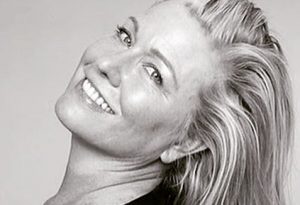 Falk College is pleased to welcome Emme ’85 as the featured speaker of the Third Annual Ann Selkowitz Litt Distinguished Speaker Series. We invite you to join us Wednesday, February 28, 2018 from 5:15 pm – 6:30 pm in Grant Auditorium in the Falk Complex for her lecture, “Facing our fears: Embracing the ones we’re with!” Free and open to the public, the lecture coincides with National Eating Disorders Awareness Week Feb. 26-March 4.
Falk College is pleased to welcome Emme ’85 as the featured speaker of the Third Annual Ann Selkowitz Litt Distinguished Speaker Series. We invite you to join us Wednesday, February 28, 2018 from 5:15 pm – 6:30 pm in Grant Auditorium in the Falk Complex for her lecture, “Facing our fears: Embracing the ones we’re with!” Free and open to the public, the lecture coincides with National Eating Disorders Awareness Week Feb. 26-March 4.
Read more about this at SU News
ACE Center’s innovative design receives honor from AIA
Ashley McGraw Architects honored by American Institute of Architects for innovative design of Falk College’s Nutrition ACE Center, Klenk Café and Teaching Kitchens
The American Institute of Architects Central New York Chapter (AIA CNY) honored Falk College, its Department of Public Health, Food Studies, and Nutrition, and its architects, Ashley McGraw Architects, D.P.C. The group’s work in Falk Complex was cited for innovative ideas, attention to detail, and dedication to the design profession as contributing to the architectural success of the Central New York region and beyond. The award was presented at the AIA Central New York’s annual Celebration of Architecture at the Hotel Syracuse. AIA CNY recognizes outstanding works of architecture through its annual design awards program. The purpose of the program is to celebrate achievements in design excellence by architects in the Central New York region and to honor the architects, clients and consultants who work together to create and enhance the environment that was built.
“We are very proud of our partners and colleagues from Ashley McGraw for this award. We could not be more pleased with the design and the excellent learning opportunities their innovative design continues to provide our students in our food, nutrition and public health programs,” says Falk College Dean, Diane Lyden Murphy.
The Susan R. Klenk Learning Café and Kitchens opened in September 2016 and provides a hands-on learning laboratory to prepare students with traditional and emerging professional competencies for careers in food, nutrition, dietetics, and public health. The facility includes an experimental food lab kitchen, commercial kitchen, baking nook and café. A video camera system allows faculty and chef instructors to broadcast classes, food demonstrations and seminars from Falk College to anywhere on campus and across the country. A generous and visionary gift from Falk College alumna, Susan R. Klenk, made the learning café and kitchens possible.
The experimental food lab includes an 8 station-teaching kitchen and an associated café. Lunch is served in the café during the last four weeks of each semester, allowing hands-on experience for the students at every stage of food planning, preparation and service.
“Not only was it a rewarding experience working with the College to design these important spaces, but it has been gratifying to witness students taking ownership of them,” says Christina Aßmann, project architect, Ashley McGraw Architects, D.P.C.
The ACE Center’s demonstration kitchen features an island-cooking suite at the front of a 50-seat lecture hall. Cameras capture the activity of cooking from every angle, images are projected on 3 large TV screens above the counter, giving the audience multiple perspectives of the activity at hand and providing the possibility of recording or broadcasting.
The learning café and teaching kitchens set the stage for industry-leading, forward-thinking approaches to food and culture, nutrition, research, and food studies development. The design fosters creativity and collaboration across a variety of departments, schools and colleges, creating interdisciplinary partnerships that support teaching innovation, student learning, research and scholarship. In addition to unlimited faculty-supervised hands-on experiences, this dedicated space provides an ideal environment for student-faculty research projects and educational community partnerships that set the SU programs apart.
Study to investigate nutritional implications of eating alone in Korea
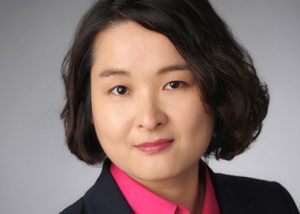
Data from the National Statistical Office (NSO) shows that the number of single-person households in Korea, totaling 539,800, comprised 27.9 percent of the total number of households in 2016. This has led to many socio-cultural changes, including dietary habits, as more and more Koreans find themselves eating alone.
“The prevalence of eating alone can be explained from two perspectives: demographic perspective of increased single-person households and a cultural perspective of the expansion of individualism,” says Dayeon Shin, Ph.D., R.D., Assistant Professor in the Falk College Department of Public Health, Food Studies and Nutrition. “Korean society has long been dominated by collectivism and community, but lately has seen an expansion in the ‘alone generation.’ These individuals are those who eat, drink, and travel alone. Eating alone, however, is not simply a matter regarding food, but rather is an outcome reflecting the structural and cultural changes in Korean society, such as changes in social relationships, long working hours, and a deepening individualist culture.”
Yet, in the midst of this growing trend, there is a lack of research surrounding the subject and its implications. Dr. Shin will help build this much-needed body of knowledge as co-investigator in a study led by principal investigator Chul-Kyoo Kim, Ph.D., a professor in the Department of Sociology at Korea University, thanks to a $13,252 grant from the Youlchon Foundation in South Korea.
“This study conducts two empirical analyses to discover the implications of eating alone in terms of actual daily life, health, and social relationships,” says Dr. Shin. “First, the dietary patterns of adults who eat alone will be identified in association with health outcomes. Second, an in-depth study is conducted among the youth population as the target group, as they can be regarded as the main generation involved in the studied phenomenon.”
For more information about research at Falk College, please visit Falk College Research Center website.
Falk College Marks Child Nutrition Day with Food Demo, Tasting at Bernice M. Wright Lab School
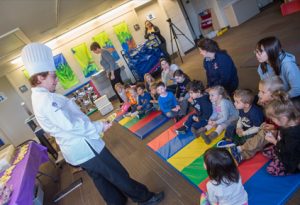
A rainbow.
This multi-colored food kaleidoscope supports a deliberate effort known as “eating the rainbow” to help children make healthy food choices. Thanks to a grant from the American Culinary Federation (ACF) in support of Child Nutrition Day in October, associate teaching professor and ACF chef Mary Kiernan, presented a mini food demonstration and tasting of the rainbow with children at the Bernice M. Wright (BMW) Lab School.
Childhood Nutrition Day celebrated on or around Oct. 16 each year focuses on fostering and promoting awareness of proper nutrition. Recently, children at the BMW Lab School, a part of Falk College’s Department of Human Development and Family Science (HDFS), worked in small groups led by Chef Kiernan and Falk nutrition major Mary Mik, who is also a Susan R. Klenk Learning Assistant. The demonstration engaged children ages two through four on such topics as how many taste buds a person has and why the foods they sampled that day are important to good nutrition.
Page 13 of 21
